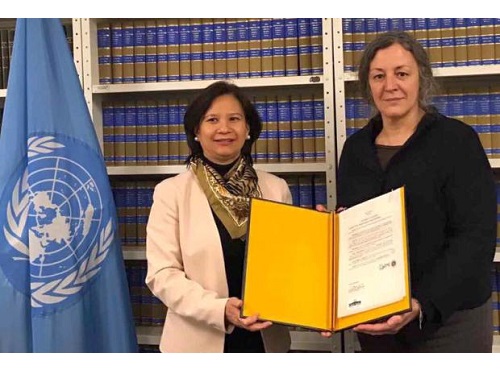
April 22, 2018 Sunday

April 22, 2018. In celebration of Earth Day 2018 and the first anniversary of the Paris Agreement taking effect in the Philippines, the Climate Change Commission (CCC) joined calls to end plastic pollution.
The Philippines became the 138th state party to the Paris Climate Accord on April 22, 2017—thirty days after the Philippine Mission to the United Nations deposited the country’s Instrument of Accession on March 23, 2017.
“Joining the global call to end plastic pollution, which is the theme for this year’s Earth Day Celebration, shows our commitment to the Paris Agreement’s goal of limiting global temperature to 1.5-degrees Celsius,” CCC Vice Chairperson and Secretary Emmanuel De Guzman said. “Plastics do not only affect biodiversity, ecosystem services, food security and human health, they also exacerbate climate change,” he added.

According to the Plastic Pollution Coalition, the drilling of oil and processing into plastic releases harmful gas emissions into the environment including carbon monoxide, hydrogen sulfide, ozone, benzene, and methane, a greenhouse gas that causes a greater warming effect than carbon dioxide.
The US Environment Protection Agency estimates as much as one ounce of carbon dioxide emitted for each ounce of polyethylene (PET) produced. PET is the type of plastic most commonly used for beverage bottles.
“Ending plastic pollution is climate action. This is why the Climate Change Commission supports the proposed Plastic Bags Regulation Act, which is currently pending at the Senate,” De Guzman said.
The proposed measure, which was filed by Senator Loren Legarda, Chairperson of the Senate Committee on Climate Change, aims to strictly regulate the production, importation, sale and use of plastic bags.
Under the bill, a point-of-sale store will be prohibited from providing the consumer with plastic bags for the purpose of carrying or transporting items or products purchased. Only plastic bags that are used to contain fresh fish, meat and poultry products, and primary plastic packaging used to pre-pack food items and in the manufacturing of finished products for sale in the general market are excluded from the prohibitions under the bill.
“The true test of our country’s commitment to the Paris Agreement will be in the implementation of the necessary measures that will help us achieve the global climate goal,” De Guzman noted. “Enacting the Plastic Bags Regulation Act will be a testament to the Philippines’ resolve to protect the environment while mitigating the effects of climate change,” he added.
###